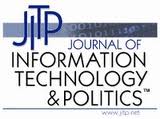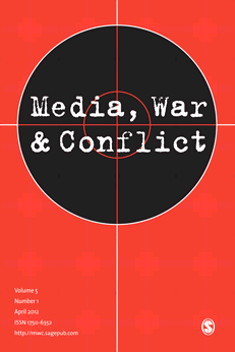 Voters seeking to connect with political parties are likely to be sorely disappointed if they try contacting a party by email. This is the key finding of new research by the New Political Communication Unit's Cristian Vaccari, published in the Journal of Information Technology & Politics. Cristian tested parties in seven countries by sending email enquiries, both asking about political issues and offering to volunteer. The response rate was staggering, and similar across all countries: the majority of emails received no specific response from the parties whatsoever. In this post he shares his detailed results.
Voters seeking to connect with political parties are likely to be sorely disappointed if they try contacting a party by email. This is the key finding of new research by the New Political Communication Unit's Cristian Vaccari, published in the Journal of Information Technology & Politics. Cristian tested parties in seven countries by sending email enquiries, both asking about political issues and offering to volunteer. The response rate was staggering, and similar across all countries: the majority of emails received no specific response from the parties whatsoever. In this post he shares his detailed results.
If parties and politicians want to reconnect with citizens, they need to be there when and where they need them. As more and more people get online and the internet becomes increasingly embedded in citizens’ everyday lives, politicians are faced with increasing challenges and opportunities not just to speak to citizens, but to listen and respond to them. In spite of the enthusiasm for social media and mobile applications, email is still the most viable and inclusive channel through which citizens can interact with politicians. According to Ofcom’s Adults’ Media Use and Attitudes Report 2014, 90% of UK internet users send and receive emails at least quarterly, which makes email the second most common activity after general browsing (91%). Age-related differences in the use of email are rather mild, with 90% of the 16-24 year-olds and 77% of the 65+ doing that at least quarterly. Social media, by contrast, are used by 69% of UK internet users and are substantially more popular among younger than older users.
Email is thus a very good example of what Rasmus Kleis Nielsen has called “mundane internet tools”. These tools are less sophisticated than other digital artifacts, but precisely for this reason they can be more useful for campaigning and mobilization to the extent that they reach broader audiences and are less difficult for them to use. Politicians ignoring emails from voters do so at their peril. A study of US citizens found that ‘candidates and their online campaigns […] risk giving participants a negative impression by not replying to email messages’, as ‘The sender of the message feels slighted if after sending the message no response or feedback is given back to the sender.’
One would expect, then, that parties and candidates in the UK and across Western democracies should pay considerable attention to incoming emails and respond to them quickly and thoroughly. After all, politicians spend a lot of time, resources, and effort in trying to capture voters’ attention, so they should cherish the opportunity to address them when they are requested to do so. However, incoming emails also pose serious challenges for political organizations: first, they take time and effort to respond to, especially if volumes are high; second, answers need to be carefully crafted, as any reply that is inaccurate, offensive, or simply off message can easily be forwarded to the media or political competitors and cause unwanted embarrassment; third, research shows that politicians are reluctant to interact with voters online because they are afraid to lose control of their message, and email exchanges initiated by citizens are less controlled by politicians than, say, email newsletters that parties and candidates send periodically to their subscribers.
To evaluate the merits of these different considerations, I conducted a longitudinal study of 194 parties and presidential candidates or party leaders in Australia, France, Germany, Italy, Spain, the United Kingdom, and the United States. The study covered each national election that occurred in these countries between 2007 and 2013, including European Parliament elections and Presidential primaries in the US. In order to assess political actors’ e-mail responsiveness, two fictitious e-mails were sent to each of them from accounts coming from their countries and writing in their official languages. One email requested information on the party’s tax policies, the other pledged to be willing to volunteer for the campaign. I then recorded whether and how quickly these emails were answered, excluding those replies that appeared to be automated. A total of 608 email exchanges (304 issue questions and 304 volunteer pledges) were considered.
The results, which are illustrated in a recently published special issue of the Journal of Information Technology & Politics, show that most parties and politicians failed to respond to both emails: 65% of the issue questions and 59% of the volunteer pledges elicited no specific answer whatsoever. By contrast, only 16% issue requests and 21% volunteer pledges were replied to within one business day, with another 15% and 17%, respectively, receiving a response within four business days, and 4% and 3% within one week ore more. British parties, which I emailed in 2009 (European elections) and 2010 (general elections), answered only 8 out of 21 issue inquiries and 5 out of 21 volunteer pledges—overall, an even poorer showing than their counterparts in other countries.
What factors made political actors more or less likely to respond? A multivariate analysis considering a variety of structural and organizational factors found that:
- Party leaders are less likely to respond than both party organizations and presidential candidate campaigns—as parties’ and presidential candidates’ online communication apparatuses tend to be more developed than those of party leaders in parliamentary democracies;
- Parties that receive more votes are more responsive to issue inquiries, but not volunteer pledges—a reflection of the fact that larger parties tend to be better resourced both financially and organizationally, but also that smaller parties are motivated not to waste opportunities to recruit new volunteers;
- Political actors belonging to the Green and Socialist and Democratic party families respond to more emails than the rest—possibly reflecting their different organizational cultures and approaches to voter engagement;
- Political actors competing in elections where turnout is lower are more likely to answer both types of emails—a sign perhaps of the fact that they understand that they cannot take voter involvement for granted and should seize any opportunity to make a connection.
Why, then, do parties and candidates fail to respond to citizens trying to contact them through the easiest and most popular online tool? Answering large numbers of personal messages that require individual consideration requires time and manpower which any campaign is hard pressed to employ as parsimoniously and effectively as possible. In particular, parties may be more likely to answer emails from people they know than from the complete strangers that wrote to them in my experiment. They may also think that answering emails such as the ones that were sent for this research may not be absolutely crucial to inform and engage their online audiences—after all, if they want to learn about their tax positions they can Google them or browse their websites, and if they want to get involved in the campaign they can sign up as online volunteers on their online engagement hubs. Finally, as my study shows, not all parties and campaigns are equal in their (lack of) responsiveness to emails, and progressive political actors in particular seem to be more keen on engaging in these exchanges than the rest.
Politicians have an understandably hard time meeting the demands of a hyper-connected society and ever-hungry media. However, their silence to citizens’ inquiries can be deafening and generate disillusionment and alienation among those voters who, instead of calling it quits and giving up on politics, still strive to engage with their representatives and hold them accountable on their own terms. My study shows they still have a long way to go.
—
Note: This column is reposted from Democratic Audit.
 Ben O'Loughlin will be lead editor of the journal Media, War & Conflict for the next 12 months, taking over from Prof. Barry Richards. The journal has enjoyed a marked upswing in the quality and quantity of submissions over the past year and the editorial team have a number of initiatives to take the journal a step forward again.
Ben O'Loughlin will be lead editor of the journal Media, War & Conflict for the next 12 months, taking over from Prof. Barry Richards. The journal has enjoyed a marked upswing in the quality and quantity of submissions over the past year and the editorial team have a number of initiatives to take the journal a step forward again.


